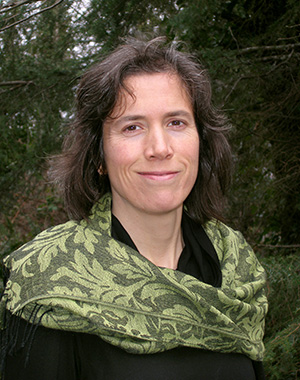
[Editor’s note: As a long-standing legal activist on behalf of ecologically healthy landscapes, Deborah Curran was recently recognized as the Real Estate Foundation of British Columbia’s Land Champion for 2016. Curran, the acting executive director of the Environmental Law Centre at the University of Victoria, is particularly focused on the evolution of legal governance to protect water.
Tyee Solutions editor Chris Wood, the author with Ralph Pentland of ‘Down the Drain: How we are failing to protect our water resources,’ spoke with Curran about what’s been accomplished and what remains to be done to ensure that clean, sufficient water continue to sustain B.C. landscapes as well as urban and agricultural needs for years to come.]
The Tyee: Congratulations on this well deserved award!
Deborah Curran: Thank you. It’s truly an honour to be nominated by my community, and my colleagues outside the university and environmental movement in this way.
Why do landscapes matter to our water?
There are two primary reasons.
From an ecological perspective, all land-use decisions affect water. We’re finding that increasingly water issues are precipitated by land-use decisions that are unconnected to water quality or quantity. And we do not make that connection virtually at all in law or in the way we make decisions about land, or about water. We’re only just starting to do that.
The second reason is more of a cultural or emotional sense of place. Waterscapes are very much connected to the landscapes through which they flow.
B.C. has recently updated its water laws, and the Water Sustainability Act came into force on Feb. 29 this year. How good a job have we done?
In my view, the new act is the best environmental and land-use statute that we have enacted since we’ve allowed land-use planning. It does certain things very, very well.
A couple of examples: the provincial ministry can now make orders when there are critically low environmental flows in water bodies or where fish are at risk. So the government can explicitly tell people to cut back on their water use or stop using water in critical situations.
Before we get to the critical situation, the act allows for more robust planning. This is an ability at a watershed scale to do a plan that has an impact on existing legal rights: it can adapt those rights and agreements, it can acknowledge Aboriginal rights to water, in a way that works in a place- and watershed-specific context.
On the flip side: there’s lots of enabling, lots of good things that could happen, but aren’t mandated necessarily. The act provides a framework for good things, but it doesn’t require good things to happen.
So [for example] our water licensing system, who gets to use water when, is still based on ‘first in time, first in right,’ as in the first licensee gets to keep using water in front of all other junior licenses who came after them in time. And we know that that’s actually not how a community works or an economy works.
So more remains to be done?
Lots more remains to be done, both on the legal side and on an informational side.
The law provides a framework within which we can do a bunch of things and there are regulations that need to be enacted to give the details to what those things are. For example, regulations setting water quality objectives.
But equally, perhaps more importantly, on the data collection side, we are virtually at zero information in B.C. about how much water we use and what it’s used for. Except for very large [water] licensees like BC Hydro or Rio Tinto Alcan, there are very, very few licensees who monitor how much water they use, and even fewer who report that to the provincial government.
You have to layer on top of that unacknowledged Aboriginal rights to water. Section 35 of the Constitution Act acknowledges treaty and Aboriginal rights defined as the right to fish, the right to use water for cultural purposes. We have no process by which to actually bring those into the water balance of any watershed where we’re making calculations about how much water can be taken out of a stream and who gets to use what.
But I have great hopes for the planning processes in each watershed being able to do that, to explicitly say, ‘In order to have salmon coming up this river we need X flow at these times of year.’
We’ve been talking about Indigenous water rights in terms of allocation, but how well do our settler laws work with the legacy of Indigenous governance? Should we be trying to integrate traditional Indigenous governance with the dominant settler legal structure?
That question is going to be grappled with quite fundamentally over the next five years.
Folks like Val Napoleon at UBC are working with Indigenous communities across Canada to define their laws. The next step is to say, how can these two systems operate in parallel? So I wouldn’t say one would be subsumed in the other, or you’d create a new governance system that’s entirely integrated. But you would have parallel governance systems that obviously interact in fundamental ways. We really just have little glimpses of that so far.
How big a challenge does climate disruption pose to our water governance ability?
I’d make the bold statement that in the next 20 years, water will drive most decision-making — around land, around what industries can locate where, who can do what.
Because we simply will have less water. There will be larger storm events in the winter, and dealing with flooding and infrastructure, and then there will be much less water in the summertime in most communities.
So climate will accelerate the sense of water shortage. It will accelerate the amount of money that is put toward planning around water, and also the way in which land and water decision-making is integrated.
I think local governments are going to start assessing the water impacts of any land-use decision that they make. Many already require proof of water before they approve any new subdivision or development.
In light of all this, where are you on the optimism-pessimism scale?
[Laughs] I wouldn’t still be doing this if was pessimistic. Or maybe I’m just a happy person.
Globally, I don’t even want to think about it. But from a B.C. perspective, the sophistication of our land use and water use conversation is much higher in British Columbia than in, I would argue, most other provinces.
We understand that on a tiny, tiny little piece of British Columbia, about two per cent, from the Okanagan Valley down to the Fraser Valley and then out to southern Vancouver Island, over 80 per cent of the people live and we grow over 80 per cent of our farm-gate receipts.
That is such a high potential for conflict, and the wonderful thing is that the potential for conflict also spurs the potential for doing things in new and very innovative ways.
How can engaged British Columbians help make sure we do what we need to do?
I find a lot of local governments, because they manage water both from a flood and a provision perspective, are well aware of water issues and are moving forward.
So for a politically engaged British Columbian, I would encourage them to raise the issue with their provincial government. Because although there has been the enactment of the Water Sustainability Act, now it is really the commitment to implementation that will put us in a good place to deal with water conflicts, and planning to prevent water conflicts into the future.
Last thoughts?
I am the ‘Land Champion,’ not the water champion. My interest in land is long-standing, and I have gravitated to water because I think water is going to be the trigger for better land-use planning, so they go hand-in-hand.
The Tyee has been a media sponsor for the Real Estate Foundation Land Awards Gala for the last three years. This article is part of an advertising and promotions package. ![]()
Read more: Indigenous, BC Politics, Environment
This article is part of a Tyee Presents initiative. Tyee Presents is the special sponsored content section within The Tyee where we highlight contests, events and other initiatives that are either put on by us or by our select partners. The Tyee does not and cannot vouch for or endorse products advertised on The Tyee. We choose our partners carefully and consciously, to fit with The Tyee’s reputation as B.C.’s Home for News, Culture and Solutions. Learn more about Tyee Presents here.
















Tyee Commenting Guidelines
Comments that violate guidelines risk being deleted, and violations may result in a temporary or permanent user ban. Maintain the spirit of good conversation to stay in the discussion.
*Please note The Tyee is not a forum for spreading misinformation about COVID-19, denying its existence or minimizing its risk to public health.
Do:
Do not: